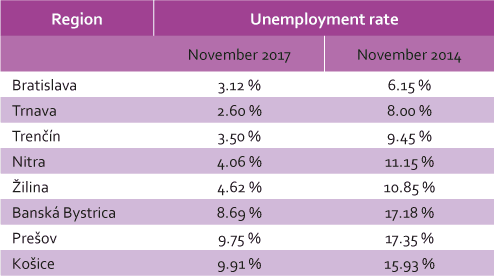The changing Slovakian economy: What it means for employers in 2018
One thing’s for sure, the Slovakian economy is enjoying a period of prosperity.
The gross domestic product (GDP) here has been rising by more than 3% over the last few years, and the inflation rate here is low, in fact, there’s even been some deflation.
The impact on the employment market, meanwhile, has, at least on the surface, been even stronger. Unemployment in the country is currently at its lowest level in history. In November 2017 it fell below 6% for the first time, to 5.95%. Compared to the November 2014 rate, 12.25%, that’s brilliant. What’s more, the number of job ads published on jobs site Profesia last year boomed to 274,293, which is an increase of nearly 70% compared to 2014.
Under the surface
That said, not everything is perfect here. There are large differences between the regions of Slovakia, with the area around the capital Bratislava and regions in western Slovakia enjoying low unemployment rates of 2-4%.
High unemployment, though, still remains a problem in the regions located in the eastern and southern parts of the country, such as Banská Bystrica, Košice and Prešov.
The unemployment rates in some of these places is currently around 9-10%, and more worryingly, the trends are long term. Among those who are unemployed in these three regions, many have been unemployed for a long time (i.e. longer than one year).
There is some hope, however. As the table below shows, unemployment is still falling in these regions - it’s just not happening as quickly as we’d like.

Trends in recruitment
The biggest problem facing Slovak recruiters is the lack of a talented workforce. Slovak companies are often unable to find workers in fields with high demand, such as industrial production, engineering, technology and development and many more.
This leads to a situation of high competition between employers, and that’s pushing up wages. It’s believed that salaries in Slovakia will grow very fast in the coming years, and it’s also likely that many companies will be forced to hire employees from abroad.
This will probably lead to migration from countries where wages are currently considerably lower than they are in Slovakia, such as Serbia, Romania and Ukraine. The supply of accommodation in Slovakia is not yet strong enough to cope with this demand, and the government is unlikely to be able to keep up with the pace of change.
Companies are also changing their standards to fit this shift in workforce makeup. According to data from www.profesia.sk, the proportion of job adverts requiring previous work experience dropped from 73% in 2015 to 65% in 2017. Similarly, the proportion of job ads requiring a university degree at Master’s level decreased from 12% in 2015 to 8% in 2017.
These changes are making HR branding and hiring strategy increasingly important. The only successful companies are those which position themselves as attractive employers to candidates, usually by offering higher wages and a broader variety of non-financial benefits.
Also in demand from candidates are other concerns, such as the social responsibility level of the company or their eco-friendliness.
What’s more, there’s also been an increased demand for work-life balance and benefits like home-based work and flexible working time. And due to increased fluctuation, companies have to struggle not only to find new candidates but also to retain their existing workforce.
Young people know that they can make these demands due to the changing economy, and are now much more likely to demand changes from their employers than they were even two or three years ago.
The job portals
And what does all this mean for a job portal like Profesia? The function of the job portals has shifted, and their role in the hiring process has become more active. It’s no longer enough to post a job ad and wait until your desired number of candidates apply. Companies are forced to actively look for talented candidates and directly approach them.
As a job portal, we’re working to improve the quality of our CV database through improvements to our search technology, increasing the number of candidates in the database and even possible changes in the pricing model.
The aim of doing this is to make it easier for our clients to search for candidates. While online job portals like Profesia are still the top choice for companies seeking new employees, improving our existing services will help us make sure that this stays true over the coming years.
Interested in recruiting from Slovakia? Find out how we can help you with our various Services or Contact Us for more information.

Why Training Alone Won’t Keep Employees from Leaving

Transparency, Data, and People: What We Learned at the HR Time Gathering in Zagreb

News for the User Experience Community: UX Research Academy for Everyone – Completely Free













